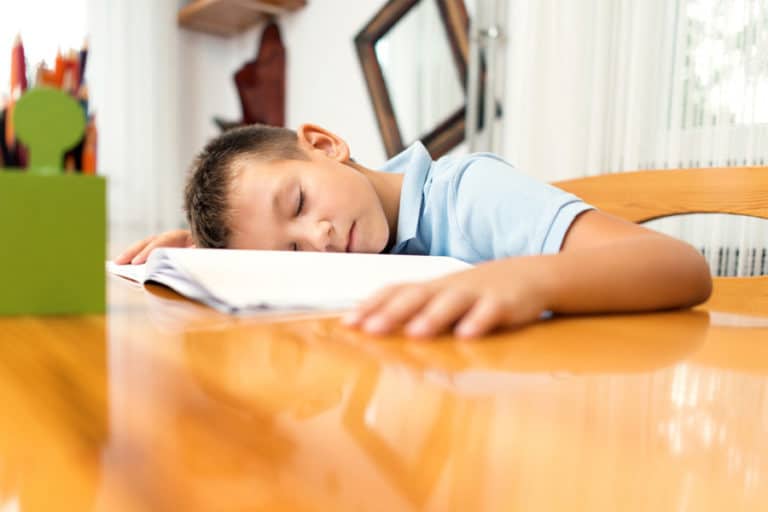How Many Hours Of Sleep Do Teens Need?

Sleep and teens | Sleep chart of teens | Sleep for enough hours | Sleep deprivation | Signs of poor sleep | Improve sleep | FAQ
Teenage is a special and crucial phase of life. During these years, a person’s physical, emotional and mental health is constantly developing. For these reasons, teens need more sleep than young children and adults.
The average amount of sleep that teenagers should get is 8 to 10 hours per day. However, several factors determine “How much sleep do teens need?”
This article provides information on sleep requirements for teens and tips for improving sleep quality for their overall well-being.
How many hours of sleep do teens need?
The National Sleep Foundation [1]National Library of Medicine: National Sleep Foundation’s updated sleep duration recommendations: final report recommends that teens should sleep 8 to 10 hours per 24 hours.
However, some teens may also be able to function well on as little as 7 hours of sleep, or some may even need 11 hours.
Chart representing sleep hours for 11-19 years old
According to the Sleep Foundation [2]Sleep Foundation: How Much Sleep Do We Really Need?, here is a chart that represents the amount of sleep required by each age group:
| Age group | Hours of sleep per day |
| 11-13 years | 9-11 hours |
| 14-17 years | 8-10 hours |
| 18-19 years | 7-9 hours |
Why sleeping for enough hours is crucial for teens?
Most people know that getting a good night’s sleep is important, but for teenagers, it’s crucial.
That’s because teens are in a critical stage of development and need plenty of sleep to help them grow and develop properly.
Mental development
During this period of time, the brain is growing and making connections at an incredible rate. In fact, research has shown that sleep plays a vital role in brain development during adolescence. It helps in:
- Emotional regulation
- Brain structure development
- Enhancing learning, attention span, and memory
- Supporting the cognitive and mental well-being of youth
Physical development
Sleep is a major contributor to fitness, physical growth, and development in teenagers.
Getting enough sleep empowers the immune system and also helps with muscle growth. It further promotes better muscle recovery and assists in regulating hormones.
Social development
Sleeping also plays an important role in social development. Adolescence is when teens try to figure out who they are and where they fit in. They are also forming relationships and learning how to interact with others.
Causes of sleep deprivation in teens
It is observed that most teenagers get about 6.5-7.5 hours [3]Better Health: Teenagers and sleep of sleep each night. There are several factors that cause a hindrance for teenagers from getting the required amount of sleep. Here are the specific reasons why teenagers are sleep deprived:
1. Hormonal changes
Puberty brings a lot of hormonal changes to the teenage body. These hormonal changes can interfere with sleep patterns and make it difficult to fall asleep or stay asleep.
Older adolescents go to sleep later than younger adolescents, which is due to the production of melatonin. This changes the body’s circadian rhythm (about two hours) of wakefulness. This makes it difficult for teens to fall asleep at the time they used to before.
Moreover, it also affects the time they wake up in the morning.
2. Academic pressure
As teenagers progress through high school, academic expectations, and coursework generally become more demanding. This can lead to increased stress and anxiety, which can, in turn, make falling asleep and staying asleep more difficult.
Irregular sleep schedules are common among college students. According to studies, [4]National Library of Medicine: Causes and consequences of sleepiness among college students 50% reported daytime sleepiness, and 70% attained insufficient sleep.
As per a survey on various factors like physical, mental, family, social, relationship, and school factors. The factors responsible for maximum stress in adolescents were school factors (56.7%) and academic tests (45.6%) [5]ResearchGate: Understanding Academic Stress among Adolescents.
3. Social activities
Teens are often involved in social activities/extracurricular activities after school, on weekends, and during holidays. These social activities can include sporting events, club meetings, part-time jobs, and hanging out with friends. This can make it difficult for teens to get to bed at a reasonable hour and get the required amount of sleep. Thus making it difficult to be up for early school.
4. Usage of electronic devices
Teens often use electronic devices such as phones, laptops, and tablets in the evening and at night. The blue light emitted from these screens can suppress the production of melatonin, which can make it more difficult to fall asleep early.
Moreover, even dim light can interfere with their circadian rhythm and melatonin secretion.
In addition, the content on these devices can often be stimulating, which can also make it more difficult to fall asleep.
5. Sleep disorders
There are various sleep disorders that can affect teenagers, such as:
- Insomnia: difficulty falling asleep or staying asleep.
- Sleep apnea: a condition in which breathing is interrupted during sleep.
- Restless legs syndrome: a condition characterized by an irresistible urge to move the legs
- Narcolepsy: a condition characterized by excessive daytime sleepiness.
These sleep disorders can make it difficult for teenagers to get the required amount of sleep, leading to sleep deprivation.
6. Lifestyle choices
Certain lifestyle choices can lead to sleep deprivation in teenagers. These include:
- Drinking caffeinated beverages: Caffeine is a stimulant that can make it difficult to fall asleep.
- Eating late at night: Eating a large meal before bed can make it more difficult to fall asleep.
- Exercising before bed: Exercise can provide a temporary energy boost that can make it difficult to fall asleep.
- Smoking: Cigarettes contain nicotine, a stimulant that can make it difficult to fall asleep.
- Taking medications: Some medications can interfere with sleep.
Signs of sleep deprivation in teenagers
It is important to know whether you are sleep deprived or getting enough sleep. Use the checklist given below to determine if you have the signs and symptoms of sleep deprivation:
- Frequent yawning, irritability, and tiredness throughout the day.
- Difficulty in focusing and concentrating on work or studies or keeping yourself up through the lectures.
- Poor decision-making and difficulty in remembering things.
- Frequent moodiness, anxiety, and depression.
- Increased sick days from school.
- Difficulty in getting out of bed in the morning.
- Feeling the need to take a nap during the day.
- Difficulty staying up after meals or while commuting.
- Feeling lethargic throughout the day or drowsy, particularly in the afternoon.
- Falling asleep on the couch or within a few minutes of getting into bed.
- Feeling a lack of interest in the activities that were once enjoyed.
- Reduced performance in sports and academics.
- Being clumsy and having slow reflexes often cause injuries.
Ways to improve sleep in adolescents
To address the problem from its root, here are some tips on improving sleep in adolescents:
As a parent
Being a parent, you can help your teen improve sleep in the following ways:
- Monitor and observe your child’s behavioral patterns, food choices, and schedule.
- Help your teenager with their weekly schedule, and try to trim their load if they are overcommitted.
- Allow your child to take a 30-40 min nap in the afternoon that can help them to recharge for the rest of the day.
- Be a role model to your child and set an example of having a good sleep routine yourself.
- Ensure your child’s bedroom is dark, quiet, and cool to help induce sleep.
- Discourage your teen from using screens at least an hour before bedtime or discourage screens in the bedroom.
- Encourage your child to exercise regularly but not close to bedtime. They may get overstimulated, making it difficult to sleep.
- Encourage restful activities during the evening, such as reading and practicing bedtime yoga.
- Manage their meals and make them healthy. A light meal at night can help your teen feel sleepy.
- Connect with your teen and check up on them in the morning, and ask them how did they sleep to get to know them better.
If you observe a bunch of the above symptoms, consult a doctor.
As a teenager
Being a teenager, to improve your sleep, you should:
- Be observant of your sleep patterns and behaviors, and take note of when you feel the most tired during the day.
- Avoid napping for more than 30 minutes [6]Sleep Foundation: Napping: Benefits and Tips, as it may make it difficult to sleep at night.
- Establish a regular sleep schedule and stick to it as much as possible. Practicing your sleep schedule for about 4 weeks will help you to stick to it better.
- Try to avoid screens at least an hour before bedtime. If you need to use a screen at bedtime, you must use the night setting.
- Make sure your bedroom is clean and hygienic, as a cluttered and unclean environment can make it difficult to sleep.
- Keep a journal of your thoughts and feelings to help you wind down before bed.
- Try to get some sunlight exposure every morning when you wake up. This will make falling asleep earlier at night.
- Exercise regularly (during the day), as this can help you sleep better at night.
- Practice relaxation techniques such as teens’ yoga or deep breathing to help you sleep.
- Limit your intake of caffeine and sugary drinks.
- Follow a relaxing bedtime routine to help you sleep, such as reading a book, taking a bath, or having a cup of hot milk.
- Avoid staying up late on weekends, as it may make sleeping difficult during the week.
- Remember, it takes about 6 weeks of extra sleep before you observe its benefits.
- Try to recover your sleep debt first, and then maintain a regular sleep schedule to prevent future sleep debt.
- If you are a teen with a part-time job, try to work for reasonable hours and avoid working late shifts.
Conclusion
As a teenager, it is important to develop healthy sleep habits and get enough sleep to support your physical and mental development.
Try to follow the above recommendations to get a good night’s sleep. Consult a doctor specializing in sleep medicine if you notice any abnormal changes in your sleep patterns or habits.
FAQs
Is it OK to get 5 hours of sleep as a teen?
Getting only 5 hours of sleep as a teen is not recommended. Teens need about 8-10 hours of sleep every night to function properly.
How much sleep do teenagers actually get?
Most teenagers get about 7-7 1/2 hours of sleep every night.
Why do teens stay up late?
There are many reasons why teens stay up late. Some teens may have a lot of homework, while others may want to spend time with friends or on social media. Some teens may also have trouble sleeping due to anxiety or stress.
References
| ↑1 | National Library of Medicine: National Sleep Foundation’s updated sleep duration recommendations: final report |
|---|---|
| ↑2 | Sleep Foundation: How Much Sleep Do We Really Need? |
| ↑3 | Better Health: Teenagers and sleep |
| ↑4 | National Library of Medicine: Causes and consequences of sleepiness among college students |
| ↑5 | ResearchGate: Understanding Academic Stress among Adolescents |
| ↑6 | Sleep Foundation: Napping: Benefits and Tips |





